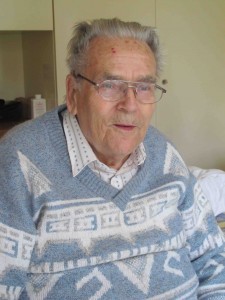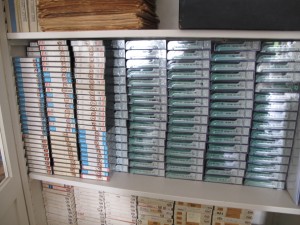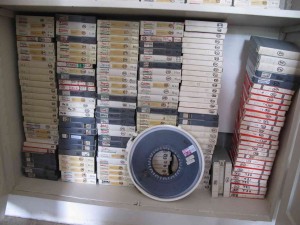This week a suitcase of audio tapes will arrive in Melbourne from Madang in PNG. While a lot of the effort of building collections in PARADISEC goes in finding tapes and encouraging people to deposit their recordings, there are some collections that stand out for the amount of work required. This is the story of one of them.
Father John Z’graggen was a missionary with the Society of the Divine Word (SVD) in Madang from 1963. His PhD thesis, Classificatory and typological studies in the languages of Madang District, was submitted in May 1969. He conducted fieldwork on a number of languages of the region and died in 2013 (for more information see Andy Pawley’s obituary, cited below).
In 2007 Professsor Andy Pawley at the ANU put me in touch with Christian Kaufmann, who had been the curator at the Museum der Kulturen Basel in Switzerland, where Z’graggen’s materials were deposited. Kaufmann was still interested in making sure Z’graggen’s material was properly described and made available. However, the change of curatorship at the museum after Kaufmann left had brought with it a change of direction that did not have the history of knowledge of the importance of the Z’graggen material.
In November 2011 Kaufmann took me to visit John Z’graggen (pictured below) in his nursing home in Menzingen in Switzerland. He was in fine form and had just published the last in a series of books of myths (The Lady Daria and Mister Kamadonga: a legend of Papua New Guinea). He was happy for his material to be digitised and archived, and gave me a disk with 4,645 legends for deposit (now at http://catalog.paradisec.org.au/collections/JZ1/items/texts).
There are some 3 metres of museum shelf space of Z’graggen’s vocabulary questionnaires and books containing oral tradition. But the main concern for preservation were the 700 or so tapes, recorded in Tok Pisin and in the local languages of the region. The tapes were not a priority for the museum and in 2011 there was a hint that any request to assist with digitising the collection would be seen as a kind of act of piracy, not something I had been accused of before, but perhaps understandable from a certain perspective.
At the same time, I started the ‘lost and found’ survey to locate other collections of recordings in need of preservation and as a result Craig Volker at Divine Word University in Madang got in touch to say there were recordings there that needed digitising, including another set of Fr Zgraggen’s tapes. After discussions with DWU I applied for funding from the Wenner Grenn Foundation in 2013 under their “Historical Archives Program” to ship and then digitise the Madang tapes. Their rather frustrating response was “Unfortunately, this project would not be eligible for funding under the narrow scope of the Historical Archives Program, which was created to encourage individuals holding unpublished research materials of value to the history of anthropology, and prepare these for archival deposit with an established repository.”
Meanwhile, in 2014 a new curator (Beatrice Voirol) was appointed at the Basel Museum and she was the opposite of her predecessor, open to working to preserve the tapes in her care. I visited her in 2014 and we put steps in motion to send tapes to The Language Archive at the MPI in Nijmegen where Paul Trilsbeek arranged for their digitisation. PARADISEC was able to cover the transport costs and, happily, most of the tapes have now been digitised.
We’ll pay for much of this work from public donations to our PayPal site thanks in part to our tax-deductible status.
And those tapes arriving this week? They seem to be additional recordings not held in Basel. Some nine years after this search began we are close to finally getting a result.
PARADISEC seeks funds to help with this kind of work, see this page for more details and to make a tax-deductible donation: http://paradisec.org.au/sponsorship.htm
*Information about Fr Z’graggen’s life comes from Andy Pawley’s obituary in Oceanic Linguistics, Volume 53, Number 1, June 2014, pp. 170-175 | 10.1353/ol.2014.0009



 Follow
Follow
Awesome work guys! Z’graggen’s work is often the only thing available for many languages in Madang, so glad to see it being preserved and passed on
Great work, Nick. Thank you for pursuing this.
Congratulations, Nick! I am really glad that things seem to fall into place, finally. John Z’graggen’s typed and annotated transcriptions of many a story recorded (not of all) are now being held in the Archive of the Anthropos Institute at St.Augustin, Siegburg, Germany; contact: Prof. Saake.
Adding to the thank yous for the effort put in here to digitize and archive Z’graggen’s materials. Thank you! Will ask people I know to donate.
In 2020 Beatrice Voirol got in touch to say she had the opportunity to scan Fr Z’Graggen’s 207 notebooks but needed some funds to pay an assistant. I arranged funds via CoEDL and she has now scanned them all. They will go into the collection shortly (https://catalog.paradisec.org.au/collections/JZ3).
These notebooks are in the form of a gestetnered questionnaire, filled out by hand for each of the following languages:
Abasakur; Adalbert; Adalbertrange; Adjora; Adzera; Aiome; Aion; Akrukay; Amaimon; Amele; Andarum; Angaua; Anor; Arawum; Ariangon; Arop; Asas; Asat; Atample; Awar; Bagupi; Bai; Baimak; Banaro; Bau; Bemal; Bepour; Bilakura; Bilbil; Biyom; Bogadjim; Bom; Bongli; Bonkiman; Bosman; Breri; Bulgobi; Bunabun; Dahating; Danaru; Degenan; Dimir; Domung; Duduela; Dumpu; Emerum; Erima; Faita; Forak; Gabutamon; Gal; Gamaei; Ganglau; Garuh; Garus; Gedaged; Gende; Gira; Girawa; Giri; Gorovu; Guarak; Gumalu; Ham; Hininon; Igana; Ikundun; Isabi; Isan; Isebe; Itutang; Jgom; Jilim; Kaian; Kamba; Kananam; Kare; Katiai; Kesawai; Kewieng; Koguman; Kolom; Kominimung; Komunimug_igana; Korak; Korige; Kosilanta; Kowaki; Kuman; Kuminimung_igana; Kwato; Lapting; Lemio; Lilau; Madang district Raycoast; Madang; Malalamai; Malas; Male; Mapi; Matepi; Matukar; Mawak; Mawan; Megiar; Midsivindi; Mikarew; Mindiri; Moere; Morafa; Moresada; Moromoringa; Mosimo; Mugil; Munit; Murupi; Musak; Musar; Nahu; Nahu_koki; Nake; Nankina; Nekgini; Neko; Ngaing; Nokopo; Osum; Panim; Parawen; Pay; Paynamar; Pila; Pondoma; Pulab; Pulabu; Rao; Rawa; Rempi; Rerau; Roindji; Romkun; Roro; Saep; Saki; Samosa; Saruga; Sausi; Sengam; Sepen; Sihan; Sileibi; Silopi; Sinsauri; Songum; Sumau; Suroy; Takia; Tangu; Tanguat; Tani; Tauya; Tevari; Ukuriguma; Ulingan; Urigina; Usino; Usu; Utu; Wab; Wadaginamp; Wamas; Wanambre; Wanuma; Waskia; Watam; Yaben; Yabong; Yagomi; Yangulam; Yarawata; Yogayoga; Yoidik.
With respect to the list of languages studied by Fr. John Z’Graggen (above): I wonder if ‘Bongli’ should in fact be Bongu.
Brian, yes, that’s right, and this is corrected in the collection (https://catalog.paradisec.org.au/collections/JZ3/items/BONGU).